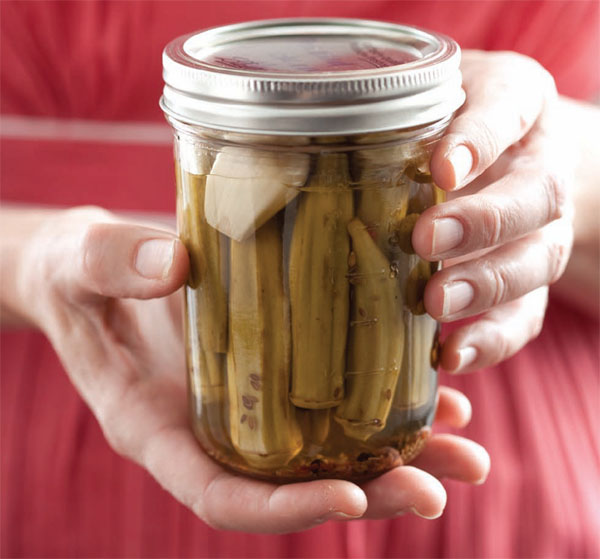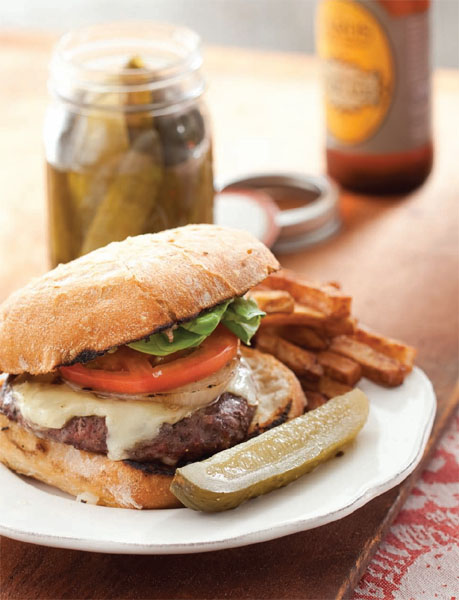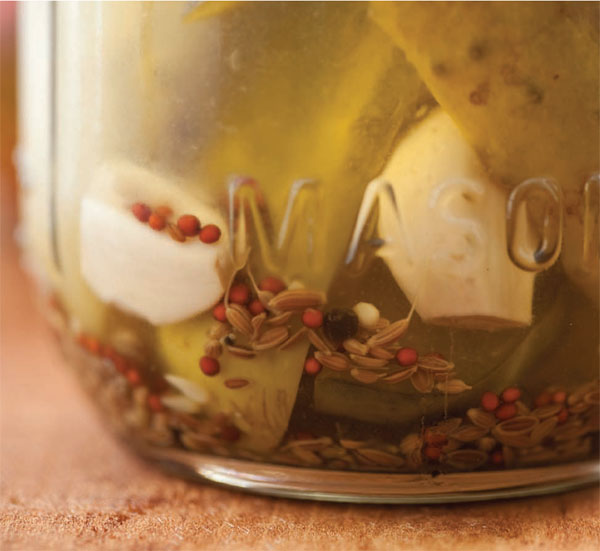Food in Jars (20 page)
Authors: Marisa McClellan
Wash and trim the beans so that they fit in your jars. Combine the vinegar, 2½ cups/600 ml water, and pickling salt in a pot and bring the brine to a boil.
Meanwhile, pack the beans into the sterilized jars, leaving ½ inch/12 mm headspace. Add ¼ teaspoon cayenne pepper (more if you're a lover of heat), 1 garlic clove, and 1 teaspoon dill seeds to each jar.
Slowly pour the hot brine over the beans in each jar, leaving ½ inch/12 mm headspace. Gently tap the jars on a towel-lined countertop to help loosen any bubbles before using a wooden chopstick to dislodge any remaining bubbles. Check the headspace again and add more brine if necessary.
Wipe the rims, apply the lids and rings, and process in a boiling water bath for 5 minutes (see
page 11
).
Let these pickles cure for at least 2 weeks before eating.
Note:
If you have easy access to dill heads, feel free to substitute them for the dill seed called for in this recipe. I wouldn't, however, recommend using fronds of dill weed, as they can break down during storage and turn the brine murky.

D
URING MY EARLY CANNING DAYS, I SPENT A WEEK
in Austin, Texas. It was there that I had the chance to try the most delectable fried okra I'd ever encountered. It transformed my opinion of this sometimes texturally challenging vegetable and sent me running to the kitchen to try it as a pickle. It was transcendently good. Pickling manages to eradicate the interior slime and just leaves you with a crunchy, brine-filled pickle. It's a dream eaten alongside a plate of spicy food.
3 cups/720 ml apple cider vinegar
3 tablespoons pickling salt
4 lemon slices
4 tablespoons Mixed Pickling Spice (page 118), divided
2 pounds/910 g okra, washed and trimmed
4 garlic cloves, peeled
Prepare a boiling water bath and 4 regular-mouth 1-pint/500 ml jars according to the process on page 10. Place the lids in a small saucepan, cover them with water, and simmer over very low heat.
Combine the vinegar, 3 cups/720 ml water, and pickling salt in a pot and bring the brine to a boil.
Meanwhile, put a lemon slice and 1 tablespoon pickling spice in the bottom of each sterilized jar. Then pack the okra in, first laying them in so that the points are up. Then insert another layer with the points down, so that they interlock. Nestle 1 garlic clove among the okra in each jar.
Slowly pour the hot brine over the okra in each jar, leaving ½ inch/12 mm headspace. Gently tap the jars on a towel-lined countertop to help loosen any bubbles before using a wooden chopstick to dislodge any remaining bubbles. Check the headspace again and add more brine if necessary.
Wipe the rims, apply the lids and rings, and process in a boiling water bath for 10 minutes (see
page 11
).
Let these pickles cure for at least 1 week before eating.
Note:
You'll find that this recipe calls for you to make more brine than many of the other similarly scaled recipes. Because okra pods are hollow, they will absorb a great deal of the brine. When you've finished filling and bubbling all the jars, they will invariably require topping off. What's more, the brine level will drop radically after you remove the jars from the canner: Do not be alarmed. The brine has simply migrated inside the okra pods. There is no need to remove the lids to top off the liquid; as long as the seal is good, they are safe to store and eat.



T
HESE PICKLES ARE AS CLOSE AS I'VE BEEN ABLE
to get to the chunky dills of my childhood. They are tangy, garlicky, and a little bit spicy. If I'm able to find smaller pickling cucumbers, I will pack them into the jars whole, as they stay crisper that way. But often, the only pickle-appropriate cukes I can find are quite large, making it necessary to cut them down to get them into the jars. If you're using sliced cucumbers, do your best to stick to the 5-minute processing time, to minimize the softening effects that the boiling water can have.
2 cups/480 ml apple cider vinegar
3 teaspoons pickling salt
8 garlic cloves, peeled
1 teaspoon red pepper flakes, divided
4 teaspoons dill seed, divided
2 teaspoons black peppercorns, divided
1 (overflowing) pint/600 g pickling cucumbers, left whole or sliced into spears
Prepare a boiling water bath and 4 regular-mouth 1-pint/500 ml jars according to the process on page 10. Place the lids in a small saucepan, cover them with water, and simmer over very low heat.
Combine the vinegar, 2 cups/480 ml water, and pickling salt in a pot and bring the brine to a boil.
Add 2 garlic cloves, ¼ teaspoon red pepper flakes, 1 teaspoon dill seed, and ½ teaspoon black peppercorns to each sterilized jar. Trim off the blossom end of the cucumbers and pack them firmly into the jars. You don't want to damage the cukes, but you do want them packed tightly.
Slowly pour the hot brine over the cucumbers in each jar, leaving ½ inch/12 mm headspace. Gently tap the jars on a towel-lined countertop to help loosen any bubbles before using a wooden chopstick to dislodge any remaining bubbles. Check the headspace again and add more brine if necessary.
Wipe the rims, apply the lids and rings, and process in a boiling water bath for 5 minutes (see
page 11
).
Let these pickles cure for at least 1 week before eating.
Note:
Make sure to stick with pickling cucumbers (also called Kirby cucumbers) for this recipe. Using other cucumbers will often result in a disappointing pickle, as they don't hold their structure as well. Also, don't skip trimming off the blossom end. It contains an enzyme that can lead to limp pickles.


I
HAVE A GO-TO SLAW RECIPE THAT CONSISTS OF SHREDDED
cabbage tossed in a vinaigrette of lime juice, olive oil, and a generous heap of cumin. One summer, awash in squash, I was determined to translate that dressing into brine. This tasty pickle was the happy result.
3 pounds/1.4 kg young zucchini, sliced into rounds ½ inch/12 mm thick
2 cups/480 ml apple cider vinegar
3 teaspoons ground cumin
3 tablespoons pickling salt
1 lime, sliced
2 teaspoons black peppercorns, divided
1 teaspoon cumin seed, divided
1 teaspoon mustard seed, divided
1 teaspoon red pepper flakes, divided
Prepare a boiling water bath and 4 regular-mouth 1-pint/500 ml jars according to the process on page 10. Place the lids in a small saucepan, cover them with water, and simmer over very low heat.
Combine the vinegar, 2 cups/480 ml water, ground cumin, and pickling salt in a pot and bring the brine to a boil.
Meanwhile, place a lime slice in the bottom of each sterilized jar. Add ½ teaspoon peppercorns, ¼ teaspoon cumin seed, ¼ teaspoon mustard seed, and ¼ teaspoon red pepper flakes to each jar.
Pack the sliced zucchini into each jar. Slowly pour the hot brine over the zucchini in each jar, leaving ½ inch/12 mm headspace. Gently tap the jars on a towel-lined countertop to help loosen any bubbles before using a wooden chopstick to dislodge any remaining bubbles. Use a wooden chopstick to work the air bubbles out of the jars. Check the headspace again and add more brine if necessary.